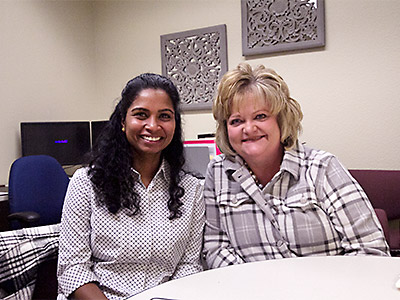
Uma Karuppasamy, TMCC alumna and paid intern at City of Reno Police Department, and Marcie Iannacchione, Internship Coordinator at TMCC.
A computer programming major at Truckee Meadows Community College had one credit left to complete her Associate of Science degree, took an unpaid internship opportunity as an impromptu move, and has now graduated as a paid intern with great job prospects.
“I wanted some experience, but with this internship, I learned how to integrate everything together; front end, back end and database development,” said Uma Karuppasamy, intern with the City of Reno Police Department. “When we’re at school, we take individual classes such as database, programming and HTML. Now I understand how it correlates and works together practically with real programs and in apps.”
Karuppasamy is the first intern on the information technology (IT) side of the Reno Police Department. RPD was so impressed with her enthusiasm, teamwork, timeliness and quality of her work that they decided to transition her unpaid position into a paid internship.
She now feels entirely prepared to step into any job in her field and excel.
“I’ve gained a lot of confidence,” she said. “Currently at RPD I’m working with a web and database developer on creating a website for the police logs. For this purpose I’m learning new skills like MVC, Bootstrap and JQuery.”
A new app called myRPD that she helped beta test has just gone live in mid-January. She is excited about the app because it is a useful service for citizens and is immediate.
“I tested if everything was working, checking for bugs,” she said. “Anyone can download the app. You can check for sex offenders if you’re moving into a new neighborhood. The Vigil Net Posts is a page of the app where you can post something suspicious in your neighborhood or wherever you are.”
Karuppasamy is more prepared for job interviews in general.
“Interning also helps you in an interview – getting out the jitters and knowing what to ask,” she said.
Setting up the Internship
In the Fall, Karuppasamy needed one credit and scheduled an appointment with advisor Tara Connolly. Connolly said she was a good candidate for interning due to a conscientious outlook and solid GPA. Marcie Iannacchione coordinated the internship with Greg Ellis, Computer Technologies Professor, and the RPD.
“We work in close connection—professors, academic advisors and department chairs—to make the experience really positive for the student and employer,” Iannacchione said.
Karuppasamy at first felt tentative to leave the familiar classroom environment.
“I didn’t know what to expect and I went in to the interview with an open mind,” she said.
After a five-week background check and fingerprint screening, she was introduced to her new workplace and found that she could easily navigate the office, complete tasks, work together with mentors and feel successful.
“Whenever you’re doing an internship, treat it as a real job,” Karuppasamy said. “Do whatever they give you to do, and ask them if there’s anything else you can do. I offered to set up an online form for the District Attorney’s Office so users of the Web page can communicate more easily.”
Her enthusiastic spark was noticed by the RPD.
“Uma is an incredible team member and human being,” wrote the RPD in her evaluation. “In her short time here, she has made invaluable contributions impacting a broad array of outcomes.”
One thing she didn’t expect, but easily learned was that in some job positions, confidentiality is an important value and skill.
“You build that skill and know that what you work on there, stays at work,” she said. “You have to maintain confidentiality.”
Karuppasamy received her one credit and graduated in December. Her supervisor had already decided, though, that the RPD wanted to keep her on after her graduation. After approvals in the department, she began to earn an hourly wage after six weeks on the job. The paid internship is now ongoing.
Karuppasamy Highly Recommends Interning
“One hundred percent – if students get a chance, they should do it,” she said. “The main things that employers are looking for is experience and working with others. Networking is important.”
Iannacchione agrees.
“The goal of an internship is to graduate with a job, or the best possible job prospects,” she said. “If a particular employer doesn’t have the ability to hire an intern, they might refer a terrific intern to another employer that is hiring. The student is also able to put the experience on their resume.”
Iannacchione advises students to come in and introduce themselves to her earlier in their college studies so she can later get in touch with them when specific internship experiences come up that fit what they’re looking for.
“When a great opportunity comes up, we can even better place you,” she said. “We get to know the students and can place them with companies that express very specific needs.”
Future Internship Opportunities
Credits possible for a semester internship range from one to eight credits, with 75 work hours for each credit earned. Students may elect a three credit placement, working for 225 hours. An internship may be repeated as an elective.
“We’re establishing more internships at the Reno Police Department and with other employers,” Iannacchione said. “A big part of this is the excellent job that Uma has done, and the work of our highly-skilled students.
“Uma is a shining star.”
For more information about internships, please contact Marcie Iannacchione in the Career Center at 775-673-7111.






